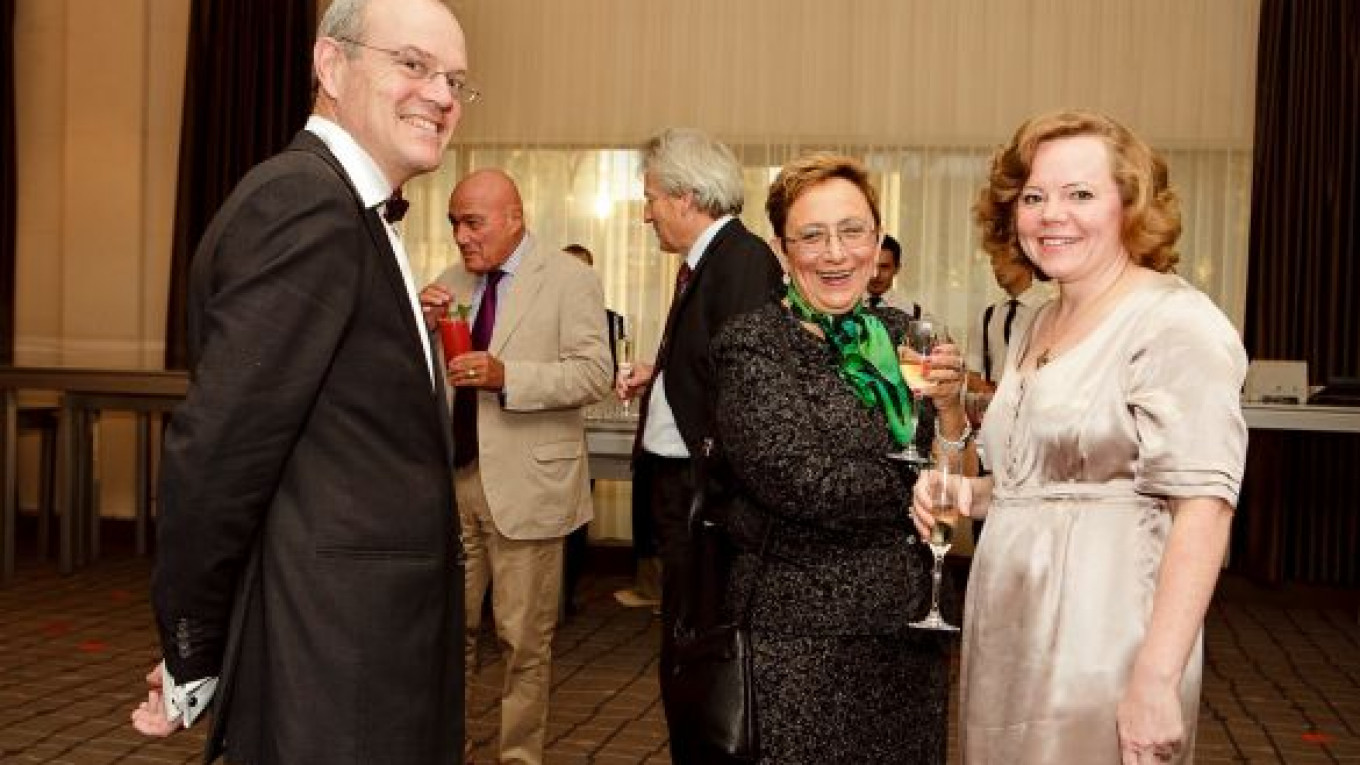The AIDS Foundation East-West, an Eastern Europe and Central Asia-focused charity working to reduce the impact of HIV on the region, hosted a black tie event last weekend to promote the foundation’s cause and celebrate its 10th anniversary.
The Red Ribbon Ball, at the Swissotel Krasnye Holmy, was a chance to reflect on progress but also to acknowledge the work ahead.
Guided by the belief that “everyone should have equal access to HIV/AIDS treatment, prevention and care,” the Amsterdam-based organization assists at-risk communities in eight former Soviet nations.
Vladimir Pozner, a renowned journalist and foundation board member, directed the event.
In Russia, “the number of people with HIV and AIDS is growing,” Pozner, 77, said in a speech Saturday night.
“We now say it’s about 500,000, but that’s officially the number of people who have registered,” he said. “There are many people who have not registered because they are afraid to or because they don’t want to. So you probably have to multiply that by at least three, which means 1.5 million, and that’s more than 1 percent, which means that we have a real epidemic.”
A common viewpoint shared throughout the evening was that a powerful obstacle to fighting the epidemic lies not in the treatment but in the public attitude toward the virus and the government’s policy on prevention.
“It’s still a taboo to discuss HIV in Russia. There’s a lot of stigma for those affected,” said Anke van Dam, director of operations and programs at the charity.
“That makes it so difficult for them to seek health care services because … they don’t dare to announce it to their employer or family,” she said. “HIV is more than 30 years in the world, and there’s so much discussion of it that you’d think people would be more aware of it. But that is still not the case in Russia.”
For the last few years, Pozner has attempted to tackle the taboo, using his media profile as a means to address the Russian people. But he admitted on Saturday that development is still obstructed by many people at the top.
“I’ve been involved in the field of AIDS and HIV for many, many years now. In the past, I’d travel around the country to many cities and towns, doing local TV talk shows with an audience of local government representatives and also regular people like students, talking about HIV,” he continued.
“Basically, in an educational way, trying to explain what it was, how to relate to people who have it, how to protect themselves and how to overcome the stigma of AIDS,” he said. “This was financed by the Global Fund, which then stopped financing it because Russia stopped classifying itself as a developing country. So that project kind of died because there was no way to finance it.”
“On the one hand, it’s true [that Russia is] not at the level of developing countries. But on the other hand, the government does not spend enough money on prevention. They do a pretty good job on treatment, but if you don’t teach people about what AIDS is and how to protect yourself, you’re only going to do treatment. That’s where I think there’s a serious problem.
“What you run into is the Russian Orthodox Church, which is against any prevention in terms of sex education and talking about condoms. Plus, there’s a certain number of public organizations that are also against it, certain politicians [he later mentioned President Dmitry Medvedev] and even the Health [and Social Development] Ministry.”
Despite all this negativity, as well as chairman Frank de Wolf’s worrying declaration that “when you look at where Africa is now in terms of the number of people getting infected, then the ratio in number of people getting infected is higher in Russia,” the charity can look back at a fruitful 10 years.
In the course of a decade, AIDS Foundation East-West has invested more than 50 million euros ($70 million) in outreach programs for drug users, prisoners and sex workers, and has done much to convince local governments to use its advice. Saturday’s ball was a fitting tribute to these successes, raising funds as well as hopes.
For more information about the foundation’s efforts or to make a donation, visit .
A Message from The Moscow Times:
Dear readers,
We are facing unprecedented challenges. Russia's Prosecutor General's Office has designated The Moscow Times as an "undesirable" organization, criminalizing our work and putting our staff at risk of prosecution. This follows our earlier unjust labeling as a "foreign agent."
These actions are direct attempts to silence independent journalism in Russia. The authorities claim our work "discredits the decisions of the Russian leadership." We see things differently: we strive to provide accurate, unbiased reporting on Russia.
We, the journalists of The Moscow Times, refuse to be silenced. But to continue our work, we need your help.
Your support, no matter how small, makes a world of difference. If you can, please support us monthly starting from just $2. It's quick to set up, and every contribution makes a significant impact.
By supporting The Moscow Times, you're defending open, independent journalism in the face of repression. Thank you for standing with us.
Remind me later.






